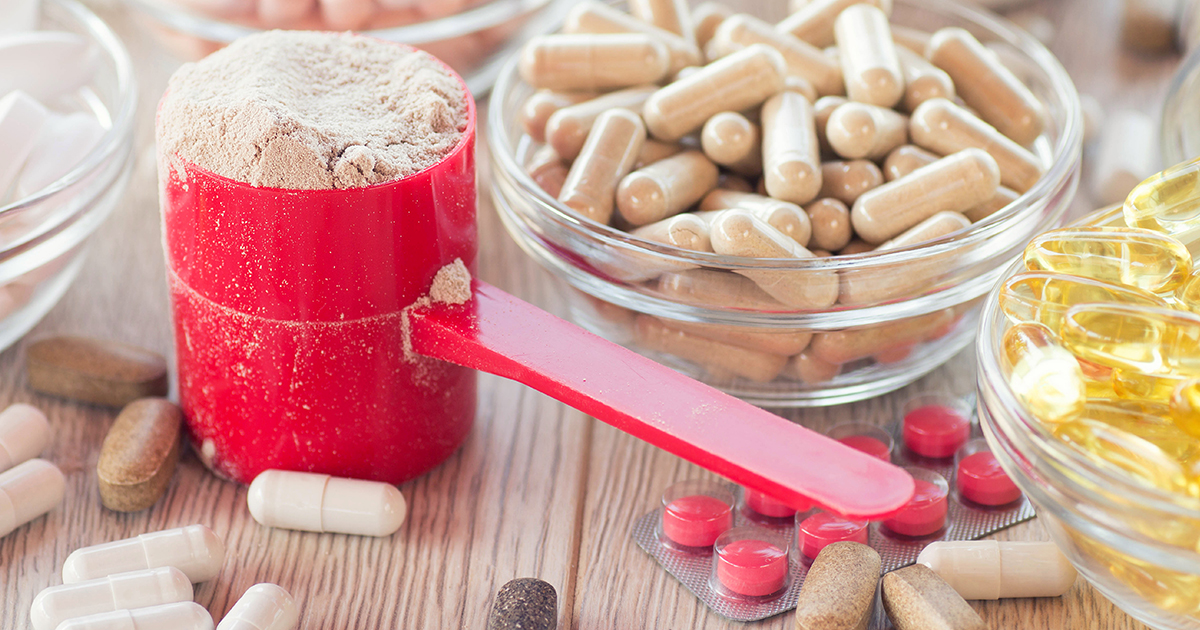
Photo by Lecic/shutterstock.com
Any experienced trainer will tell you that supplements are crucial to building and maintaining size, strength, and conditioning. But taking random supplements without a well-thought-out plan is as pointless and counterproductive as training without a structure or schedule. Below are some of the most important supplements to include in your nutrition arsenal as well as an easy-to-follow sample plan to ensure you’re reaping the benefits of every single macronutrient and amino acid.
PROTEIN
Newsflash: the body uses protein to build, repair, and maintain muscle tissue, hence the reason why it’s frequently cited as the most important macronutrient when it comes to getting in shape. “For most physically active people, a daily intake of 0.8 grams to a full gram of protein per pound of bodyweight is ideal for muscle growth, while highly active athletes might shoot for even more,” says Garrett Moher, Personal Trainer and Physique Competitor. Though you should be trying to get as much protein as possible from the foods you eat, shakes are an easy and healthy way to keep your protein consumption up around the clock. Take whey protein in the mornings or after a workout when your body is starving for a rapidly-absorbable source of nutrients, and slower-digesting casein protein at night to stave off muscle breakdown while you sleep.
MULTIVITAMIN
Too many trainers center their diets on the “big three”—protein, carbohydrates, and fats—with little consideration to all the other things your body needs to function and stay healthy. “Due to the lack of nutrients found in many foods these days, coupled with the lack of variety in most people’s diets, multivitamins are becoming more and more important,” says Moher. Multivitamins provide a wide array of vitamins and minerals that strengthen the immune system and help protect against disease. These include things like vitamin E, which prevents cell damage, magnesium to maintain strong bones, and zinc, which heals wounds and helps with digestion. Ask a pharmacist what brand is right for you and get into the habit of popping one of these health-boosting suckers each morning.
PRE-WORKOUT
After protein, pre-workouts are one of the most popular supplements on the market because of the real impact they can have on your training. “When taken correctly, pre-workouts have the ability to take workouts to the next level and help you to train harder and longer,” says Moher. While every pre-workout formula varies, almost all contain some combination of the amino acid beta-alanine, caffeine, and vitamin B12, all of which work together to provide a quick jolt of energy, prolong endurance, and sharpen focus during a workout. The ingredients between brands vary, with some emphasizing more of a muscle-swelling pump and others focused on boosting energy and endurance. Do your research and read the ingredients carefully to ensure you’re getting the right product for your style of training.
CREATINE
Creatine is a compound produced in the human body that increases the production of adenosine triphosphate (ATP), the body’s chief energy molecule. For this reason, it is not only one of the most popular supplements on the market, it’s also one of the most researched with hundreds of studies having been conducted to quantify the various benefits it provides. Aside from energy, creatine provides strength and power and helps to build lean muscle, explains Moher. “Since it’s hard to obtain through diet, supplementing with creatine can greatly improve performance.” Read the dosage instructions carefully because this supplement usually involves a “loading” phase in which you take a specific amount to build up levels in the body, followed by a “maintenance” phase in which you’ll take a lower daily dosage.
BRANCHED-CHAIN AMINO ACIDS (BCAAs)
Leucine, isoleucine, and valine are known as branched-chain amino acids because of their branch-like molecular structures. Though they are found in whey and casein protein powders, in order to reap the full benefits, they should be taken on their own. The good thing about BCAAs is that because they are metabolized in the muscles rather than the liver, they almost immediately go to work building muscle and providing energy. “Supplementing with BCAAs during a workout can help speed up the recovery process, boost endurance, and keep the body in an anabolic state,” says Moher. BCAAs can be taken every day, but dosages on non-training days will be different than when taken during a workout, so be sure to read the label carefully.
GLUTAMINE
Glutamine is the predominant amino acid in skeletal muscles and is crucial for both protein synthesis and transporting nitrogen throughout the body. It also plays an important role in gut health and immune system support. Glutamine is a “conditionally essential” amino acid, meaning the body has a mechanism to create enough to normally meet its needs. However, during intense exercise, the body’s glutamine levels can become depleted, causing muscles to break down, and the immune system to become compromised. “While there is no real optimal time of day to consume glutamine, getting 20 grams a day is ideal if you’re doing any kind of weight training,” advises Moher. Glutamine powders are typically among the most affordable on the market and mix well with protein shakes if you don’t want to take it on its own.
VITAMIN C
By now, everybody should know the benefits of vitamin C. In addition to preventing scurvy, it is a powerful antioxidant that has been shown to reduce the frequency and duration of colds and boost the body’s absorption rate of iron when paired with non-meat iron sources like eggs, vegetables, and nuts. Vitamin C is also required for the production of collagen, the body’s most abundant protein, and an important structural component of our tendons, ligaments, and skin. The one downside to vitamin C is that, much like protein, the body does not store it, says Moher. For this reason, it is important to keep up a healthy daily intake through both foods and vitamin supplements.





















